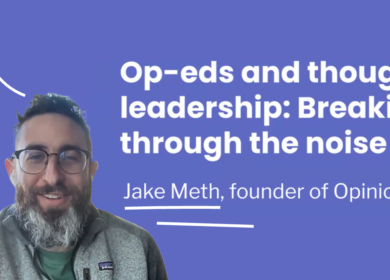
By Matthew Burrows, Account Manager
The last time I was in Las Vegas, I was 3 years old and I won a Ninja Turtle doll from Circus Circus. 29 years later, my interests were decidedly different (but perhaps no less geeky), as I went there for my very first Consumer Electronics Show to support our Tuya client in showing off their AI+IoT platform for smart home devices.
Rather than a pile of casino winnings or a plush Donatello, I came away with valuable perspective on how companies need to be presenting themselves at events like these, and I’d like to share that to help you get the most out of tech’s glitziest event.
No Company is an Island (Bridges are Expected)
It sounds like a no-brainer item to remind someone presenting at CES with its more than 4,500 exhibitors that they’re not alone, but it’s a simple lesson that should be baked into any talking points you have going into any trade show. Whether it’s questions I got from media, announcements made by booth neighbors or chatter from attendees desperately trying to fit in a cup of coffee between meetings, one message resounded: “How are you working with others?”
This is particularly true of the smart home offerings at the Sands Expo — interoperability and interconnectivity were the words of the day, and exhibitors were expected to prove it. Much of the show’s appeal is still seeing the coolest new products and gadgets (and that will probably not change for a while), but in an age of short-term startups and crowdfund efforts flaming out, there’s as much interest in a company’s ability to survive. Do you have customers lined up? How many? Partners you’re working with? These questions will be some of the first you hear during any expectations. I saw eyes widen the most at Tuya’s impressive statistic of having over 180,000 partners and customers worldwide — showing a wide global network of confidence in a single number. It doesn’t have to be an earth-shattering number, but even the smallest startup needs to be showing they have allies.
Why Should I Worry? Why Should I Care?
As he so very often is, Walt Mossberg remains a fountain of wisdom to take note of. The day before CES’s official opening, and in the early morning moments of Media Day, he sent this withering shot across the Twitter bow:

Irrelevance.
The word hung in the air as I stared and blinked at my computer screen. Walt has no reason to pull his punches, and I took the word as a challenge — and I think everyone who does tech PR should as well, and not just during trade show season. (Listen up, B2B folks, this goes for you too.)
Being cool is no longer enough on its own, and that’s probably been true for a bit. You have to show you are relevant, which boils down to: you have to matter to the everyday person.
We often say “explain this to a 5-year-old” as a way to cut through the Sea of Acronyms and arrive at The Point of What It Is That You Do, but it turns out there was a second objective all along: The Point of Why Someone Should Care.
“I’m a smart home owner and I’ve got 20 minutes to figure this sh** out before I give up and gun down a bottle of wine,” I overheard a booth visitor put in the direction of a flummoxed presenter during Day 2. “Why should I care?”
You can take a minute to blink at the colorful language and imagery (I did), as long as you hone in on the question and realize it’s a completely valid one.
I’d like to highlight and applaud the folks at Moen showing off their Flo smart faucet, because their presentation (that as their booth neighbor I overheard a few times) always returned to what the new-fangled features would mean for the consumer — saving water (and therefore money on the water bill), keeping your sink free of polluted hands grasping for the valve, etc.
After the Show, It’s the After Party, and That’s Where the Real Work Begins
Media-only events are a must if you’re doing CES. A must.
Whether you go for CES Unveiled, Pepcom’s Digital Experience or some other media event, you’ll find an invaluable opportunity that cuts through the noise and brings analysts and media to you.
I kept a tally of everyone who stopped by at our Pepcom table and found the number of visitors during a 3-hour event equaled about a day and a half’s worth of media and analyst booth traffic. It’s small, intimate, and a chance for pointed conversations without having to shout over the epic din of the show floor.

Photo Credit: Pepcom
With that in mind though, keep the above tips in mind — it’s even more important in these smaller environments.
Penny Slots — The Quick Takes
Talk About Privacy, Security and Environmental Accountability — Now
Without getting into a political diatribe (we’ve got enough of that headed our way this year), you need to be ready to talk about how you handle customer data and privacy, if you’re compliant with privacy laws such as GDPR and CCPA, and your plans to address your own environmental impact. These were also some of the prevailing questions and discussions during the show, and that’s going to continue for the year ahead.
Be Real, Be Real, Be Real
You’ve probably seen Lou extol the virtues of tossing messaging to the curbside and embracing authenticity and human-like communication. I’m here to emphatically second that notion: If I had a dollar for each eye roll, sigh or reproachful look given at a piece of boring, stale unnatural messaging point during the show, my retirement account would be looking pretty good right now.
Hydrate or Die-drate
You’d think this wouldn’t need to be added, but the number of people who were crashing due to lack of water was surprisingly high. (Repeat previous comment of “If I had a dollar …”) Take the amount of water you’d drink on a normal day, and double it. No wait, triple it. You’ll thank me later.

